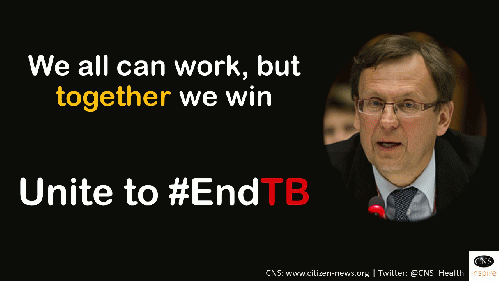
Partnerships beyond ministries of health are important to increase progress towards #endTB
(Image by CNS (Citizen News Service)) Details DMCA
Despite commitment from the governments to end tuberculosis (TB) by 2030 (one of the targets of Sustainable Development Goals or SDGs) the pace of TB decline casts serious doubts on eliminating TB in the next 14 years.
The latest Global TB Report of the World Health Organization (WHO) has set the alarm bells ringing: not only have annual TB cases and TB deaths increased compared to previous year, but also the pace of TB decline is not steep enough so as to reach the finishing line in the fight against TB by 2030.
'Business as usual' will not work. With this intent we spoke to one of the key people in the global fight against TB, who shared important lessons from the past 25 years and suggestions on how we can accelerate the pace of TB decline so as to meet the goals within promised timelines.
Dr Mario Raviglione had contributed to the development of the DOTS strategy in 1994, set up the global drug-resistance surveillance project (1994) and the global TB surveillance and monitoring system (1995), and has also been the Director of the Global TB Programme at the WHO since 2003. Looking back, it is difficult to deny how the efforts to control TB grew manifold in the past two decades. However the finish line is not yet in sight and lot more needs to happen to get to #endTB target by 2030.
Dr Mario Raviglione who is among the top 10 most cited authors in the TB field globally, spoke with CNS (Citizen News Service) on the sidelines of the 47th Union World Conference on Lung Health in Liverpool, UK. This interview is part of CNS Inspire series -- featuring people who have decades of experience in health and development, and learning from them what went well and not-so-well and how can these learnings shape the responses for sustainable development over the next decade.
Fight against TB gained momentum in past two decades
The #EndTB is not in sight but we need to acknowledge how an age-old battle against TB galvanized in the past two decades. "Some of the big moments I have seen in the last few years are linked to the innovations that we finally have after decades in the field of TB. For instance the new molecular diagnostics have been the game changers, and I strongly believe these are the starting point for any TB care and control programme. It is not just the efficiency of the machine or the new technology, which is no doubt remarkable, but also the spirit of innovation that accompanied it. This innovation led us to a tool that can make the diagnosis within a couple of hours, which provoked reaction -- like 'we believe in microscopy' or 'we do not want to adopt new tools'! As this kind of controversy really pushes people up, so they understood eventually and finally we have new tools for the first time in almost a century to quickly diagnose not just TB but also drug-resistant TB. The two new drugs also provoked enthusiasm, although they are currently limited to multi-drug resistant TB only," said Dr Raviglione.
(Note: You can view every article as one long page if you sign up as an Advocate Member, or higher).





